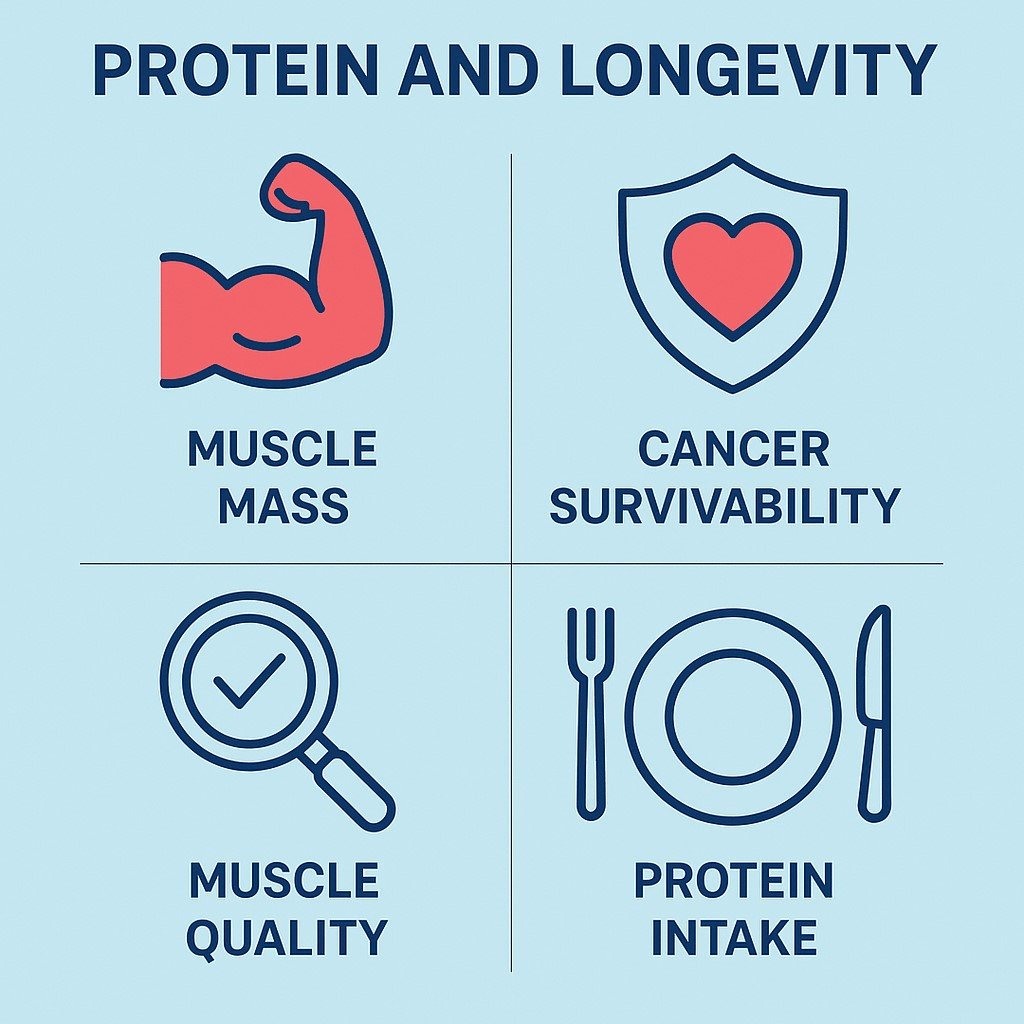Protein: Why It's The Key To Longevity, Muscle Health, And Overall Wellness
High Intensity Health Podcast with Dr. Gabrielle Lyon | June 5, 2025
Protein is one of the most talked-about macronutrients in the health and fitness world, yet it’s also one of the most misunderstood. From debates about how much protein we need to concerns about its role in cancer and aging, there’s a lot of noise out there. In this blog post, we’ll dive deep into the science of protein, debunk common myths, and provide practical tips to optimize your protein intake for muscle health, longevity, and overall wellness.

Why Protein Matters: The Foundation of Muscle and Longevity
Protein is more than just a building block for muscles—it’s a critical component of overall health. Dr. Gabrielle Lyon, a leading expert in muscle-centric medicine, emphasizes that muscle is the organ of longevity. Maintaining muscle mass isn’t just about looking fit; it’s about staying strong, independent, and healthy as you age.
Key Takeaway: Muscle mass is directly linked to longevity and quality of life. Protecting and building muscle should be a priority at every stage of life.
How Much Protein Do You Really Need?
The Recommended Dietary Allowance (RDA) for protein is 0.8 grams per kilogram of body weight, but this is the bare minimum to prevent deficiency—not the optimal amount for health and performance. Dr. Lyon recommends 1 gram of protein per pound of ideal body weight for most people.
For example, if you weigh 110 pounds, aim for 110 grams of protein per day. This might sound like a lot, but it’s achievable with a little planning.
Practical Tip: Start your day with a high-protein breakfast. Aim for 30-50 grams of protein in your first meal to kickstart muscle protein synthesis after an overnight fast.
Protein and Cancer: Separating Fact from Fiction
One of the biggest concerns people have about protein is its potential link to cancer, particularly through the activation of mTOR (mechanistic target of rapamycin), a pathway involved in cell growth.
However, Dr. Lyon explains that mTOR is not the villain it’s often made out to be. While it’s true that mTOR is stimulated by protein (specifically the amino acid leucine), it’s also activated by other factors like insulin, excess calories, and even exercise.
Key Takeaway: Protein is not the primary driver of cancer. In fact, muscle mass is a critical factor in cancer survivability. Studies show that individuals with more muscle mass have better outcomes, regardless of the type of cancer.
The Role of mTOR and Autophagy
While chronic overstimulation of mTOR can be problematic, short-term protein restriction (such as fasting or reducing methionine and sulfur amino acids) can induce autophagy, a cellular cleanup process that removes damaged cells and promotes regeneration.
Practical Tip: Consider incorporating cyclical protein restriction (e.g., 4 days of reduced protein intake) to trigger autophagy. However, this approach is not suitable for older adults or sedentary individuals, who need consistent protein intake to maintain muscle mass.
Protein for Aging: Why Older Adults Need More
As we age, our bodies become less efficient at using protein to build and maintain muscle. This is why older adults need more protein, not less.
Key Takeaway: Aging individuals should prioritize protein intake to combat sarcopenia (age-related muscle loss) and maintain strength and independence.
Practical Tip: Older adults should aim for 1.6 grams of protein per kilogram of body weight or more, focusing on high-quality sources like grass-fed beef, eggs, and dairy.
The Importance of Muscle Quality
It’s not just about how much muscle you have—it’s about the quality of that muscle. Poor muscle quality, characterized by fat infiltration and mitochondrial dysfunction, is linked to conditions like insulin resistance, PCOS, and metabolic syndrome.
Key Takeaway: Strength training is the best way to improve muscle quality and metabolic health. Even if you don’t see visible changes in muscle size, getting stronger is a sign that your muscle quality is improving.
Practical Tip: Incorporate progressive overload into your workouts. Gradually increase the weight or resistance to challenge your muscles and promote growth.
Protein Timing: When and How Much to Eat
The timing of your protein intake matters. Research suggests that bolus dosing (consuming larger amounts of protein in fewer meals) is more effective for muscle protein synthesis than spreading protein intake evenly throughout the day.
Practical Tip: Aim for 30-50 grams of protein per meal, with a focus on your first and last meals of the day. This ensures your body has the nutrients it needs to build and repair muscle.
Protein Sources: Quality Matters
Not all protein is created equal. Animal-based proteins like beef, chicken, and eggs are complete proteins, meaning they contain all the essential amino acids your body needs. Plant-based proteins, while beneficial, often lack one or more essential amino acids.
Key Takeaway: Prioritize high-quality, nutrient-dense protein sources like grass-fed beef, pasture-raised eggs, and wild-caught fish.
Practical Tip: If you’re vegan or vegetarian, consider supplementing with branched-chain amino acids (BCAAs) or creatine to ensure you’re meeting your protein needs.
The Role of Exercise in Muscle Health
Exercise is a non-negotiable component of muscle health. Strength training not only builds muscle but also improves insulin sensitivity, boosts metabolism, and supports overall health.
Key Takeaway: Strength training is essential for maintaining muscle mass and preventing age-related decline.
Practical Tip: Aim for 3-4 strength training sessions per week, focusing on compound movements like squats, deadlifts, and bench presses.
Protein Myths Debunked
Myth 1: High Protein Diets Cause Kidney Damage
There’s no evidence that high protein intake harms healthy kidneys. In fact, protein is essential for kidney function.
Myth 2: Plant-Based Diets Are Just as Effective for Muscle Building
While plant-based diets can support muscle health, they often require careful planning to ensure adequate protein intake and amino acid balance.
Myth 3: Protein Restriction Extends Lifespan
While short-term protein restriction may have benefits, long-term restriction can lead to muscle loss and negatively impact health.
Practical Tips for Optimizing Protein Intake:
- Start Your Day with Protein: Aim for 30-50 grams of protein at breakfast.
- Prioritize Whole Foods: Choose high-quality protein sources like grass-fed beef, eggs, and wild-caught fish.
- Use Supplements Wisely: Consider BCAAs or creatine if you’re vegan or vegetarian.
- Time Your Protein: Focus on bolus dosing with larger protein-rich meals.
- Strength Train Regularly: Incorporate progressive overload to build and maintain muscle.
The Gut-Muscle Connection: How Your Microbiome Affects Protein Utilization
Emerging research suggests that your gut microbiome plays a role in how effectively your body uses protein. Some individuals, particularly those with a diverse and healthy gut microbiome, may be able to scavenge essential amino acids from gut bacteria.
Key Takeaway: A healthy gut microbiome may enhance protein utilization, especially for those on plant-based diets.
Practical Tip: Support your gut health by consuming fermented foods like yogurt, kefir, and sauerkraut, and consider a high-quality probiotic if needed.
Protein and Hormones: The IGF-1 Debate
Insulin-like Growth Factor 1 (IGF-1) is another topic of debate in the protein world. While some worry that high protein intake increases IGF-1 levels (which are associated with growth and potentially cancer), Dr. Lyon explains that IGF-1 is essential for muscle repair, brain function, and overall health.
Key Takeaway: IGF-1 is not inherently bad. It’s a critical hormone for growth and repair, and its levels naturally decline with age.
Practical Tip: Focus on maintaining muscle mass through protein and exercise, rather than worrying about IGF-1 levels.
The Climate Change Debate: Can You Eat Protein Sustainably?
There’s a growing push to reduce meat consumption for environmental reasons, but Dr. Lyon argues that eating your way out of climate change isn’t realistic. The primary drivers of climate change are industry, electricity, and transportation, not individual dietary choices.
Key Takeaway: Choosing high-quality, sustainably sourced protein is more impactful than eliminating meat altogether.
Practical Tip: Opt for grass-fed beef and pasture-raised poultry, which are more sustainable and nutrient-dense than conventionally raised options.
Protein for Kids: Building a Foundation for Lifelong Health
Children need protein to support growth, development, and natural strength. Natural strength, which develops during puberty, sets the stage for lifelong muscle health.
Key Takeaway: Encourage kids to eat protein-rich foods and stay active to build a strong foundation for adulthood.
Practical Tip: Offer kids ground beef, eggs, and dairy as protein sources, and limit exposure to hyper-palatable junk foods.
Final Thoughts: Protein as the Foundation of Health
Protein is more than just a macronutrient—it’s the foundation of muscle health, longevity, and overall wellness. By prioritizing high-quality protein, strength training, and smart timing, you can optimize your health and protect your body as you age.
Key Takeaway: Protein is not just for bodybuilders—it’s for anyone who wants to live a long, healthy, and independent life.
By incorporating these practical tips and insights into your daily routine, you can harness the power of protein to build a stronger, healthier, and more resilient body. Remember, it’s never too late to start prioritizing your muscle health—your future self will thank you!

About Dr. Gabrielle Lyon
Dr. Gabrielle Lyon is a leading expert in muscle-centric medicine and the founder of the Institute for Muscle-Centric Medicine™. Check out her book, Forever Strong, to dive deeper into the science of muscle health and longevity.
*Podomline may earn a small commission if you buy through these links—at no extra cost to you. Thank you
Related Post





